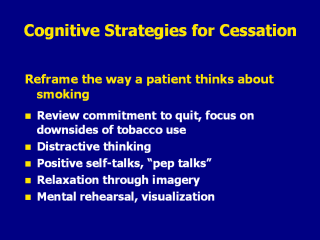 |
Did you see
the Part I of this lecture? Cognitive strategies focus on retraining the
way a patient thinks. Many quitters panic because they are thinking about
tobacco after they quit, and this leads to relapse. Thinking about
cigarettes (or other forms of tobacco) is normal. The trick is not to dwell
on the thought. As tobacco users move toward sustained abstinence, they
learn to recognize that thinking about a cigarette doesn’t mean they need to
have one.
Some examples of cognitive strategies include the following:
Review of one’s commitment to quitting can help, including reminding oneself
that cravings and temptations are temporary and will pass. Sometimes it
helps a patient to announce, either silently or out loud, “I want to be a
nonsmoker, and the temptation will pass.” Or each morning, to look in the
mirror and say, “I am proud that I made it through another day without
tobacco!”
Deliberate, distractive thinking can help the patient move current thought
processes to issues other than craving or temptation to use tobacco.
Positive self-talks, or “pep-talks,” involve saying things such as, “I can
do this,” or reminding oneself of previous difficult situations in which
tobacco use was avoided successfully.
Relaxation through imagery helps the patient to center the mind on positive,
relaxing thoughts. This can help to ease the anxiety, stress, and negative
moods that may trigger tobacco use.
Mental rehearsal and visualization involves envisioning situations that
might arise and how best to handle them. This method is commonly used by
athletes prior to a game. For example, a goalie might envision (or enact,
during pregame warmups) how to block different types of shots or plays from
opposing players. In the case of smoking, a person might envision what would
happen if he or she were offered a cigarette by a friend—he or she would
mentally craft and rehearse a response and perhaps even practice it by
saying it out loud.
Slide is used with permission, Rx for Change: Clinician-Assisted Tobacco
Cessation. Copyright © 1999-2007 The Regents of the University of
California, University of Southern California, and Western University of
Health Sciences. All rights reserved. |
